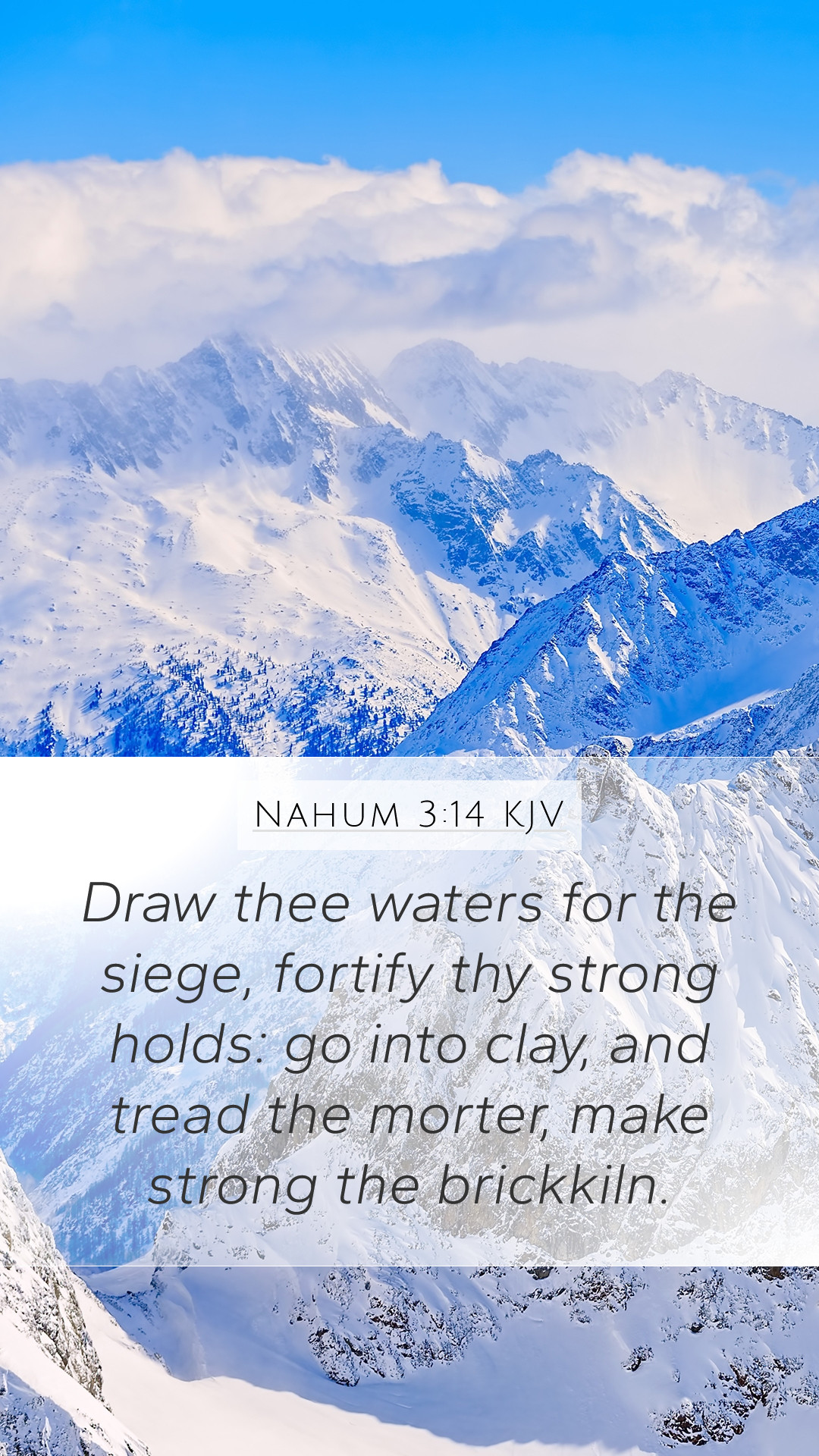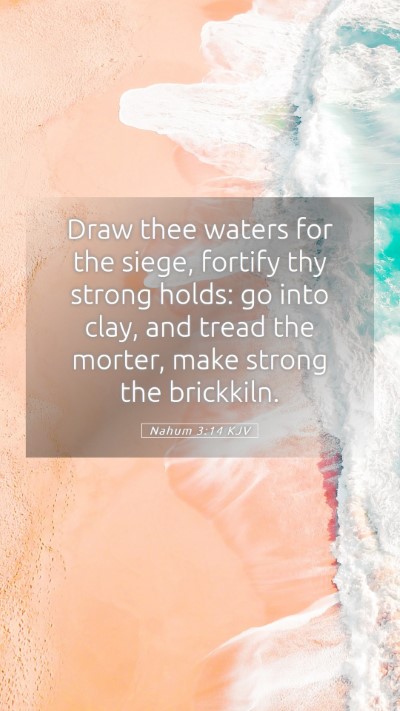Old Testament
Genesis Exodus Leviticus Numbers Deuteronomy Joshua Judges Ruth 1 Samuel 2 Samuel 1 Kings 2 Kings 1 Chronicles 2 Chronicles Ezra Nehemiah Esther Job Psalms Proverbs Ecclesiastes Song of Solomon Isaiah Jeremiah Lamentations Ezekiel Daniel Hosea Joel Amos Obadiah Jonah Micah Nahum Habakkuk Zephaniah Haggai Zechariah MalachiNahum 3:14 Meaning
What is the meaning of Nahum 3:14?
Draw thee waters for the siege, fortify thy strong holds: go into clay, and tread the morter, make strong the brickkiln.
Nahum 3:14 Bible Verse Meaning
Bible Verse Meaning: Nahum 3:14
Nahum 3:14 states: "Draw thee waters for the siege, fortify thy strongholds: go into clay, and tread the mortar, make strong the brickkiln." This verse reflects a moment of impending judgment against Nineveh, the capital of Assyria, demonstrating the futility of their preparations against divine intervention.
Contextual Background
The Book of Nahum is a prophecy that foretells the downfall of Nineveh due to its wickedness and idolatry. The message comes in the form of a poetic and vivid prophecy against a city that once held power but is now destined for destruction. Understanding the historical context of Assyria's oppression of Israel enhances this scripture's interpretation.
Bible Verse Commentary
- Matthew Henry: He emphasizes the irony of the call to build defenses, as the city would ultimately fall despite their efforts. He implies that no amount of preparation can stave off God’s judgment, illustrating a lesson on reliance upon God rather than human strength.
- Albert Barnes: Barnes elaborates on the preparations that the people are advised to undertake and sees these actions as a stark contrast to their inevitable doom. He points out that despite their efforts, the security they sought through earthly means was powerless against divine will.
- Adam Clarke: Clarke notes that this verse admonishes the inhabitants of Nineveh to futilely reinforce their city against a siege, underscoring the futility found in resisting God’s decree. He discusses the symbolism of clay and mortar, illustrating the fragility of human constructs compared to divine authority.
Key Insights from Commentaries
The collective insights from these scholars lead to several themes:
- Divine Sovereignty: The ultimate power of God over worldly affairs is evident, and no earthly preparation can resist divine judgment.
- Futility of Human Efforts: The strongholds and defenses serve as metaphors for human attempts to secure safety and power, which are ultimately ineffective against God's plans.
- Impending Judgment: The verse alludes to an unavoidable consequence for the wickedness of Nineveh, illustrating the need for repentance rather than reliance on fortifications.
Applications and Reflections
This verse prompts several applications for modern readers:
- Understanding Human Limitations: Modern applications can be drawn regarding the limitations of human strength and planning without God’s guidance.
- Assurance of God’s Justice: Believers might find comfort in knowing that God sees injustice and will act according to His will in due time.
- Call to Rely on God: Individuals are encouraged to put trust in divine providence rather than their own abilities or resources.
Cross References
Related Biblical passages that enhance the understanding of Nahum 3:14 include:
- Isaiah 10:5-19 - Discusses God's judgment against Assyria.
- Jeremiah 50:9 - Prophecy against Babylon, echoing themes of impending doom.
- Revelation 18 - The fall of Babylon as a symbol for judgment against sinful nations.
Conclusion
Nahum 3:14 serves as a profound reminder of the limits of human power and the ultimate authority of God in administering justice. As believers seek to deepen their Bible verse understanding and Bible verse interpretations, passages like this highlight the necessity to consider divine will over human plans.
For those participating in Bible study groups or utilizing Bible study tools, engaging with the insights from public domain commentaries can greatly enrich the Bible study experience and facilitate a more robust Bible verse commentary.


